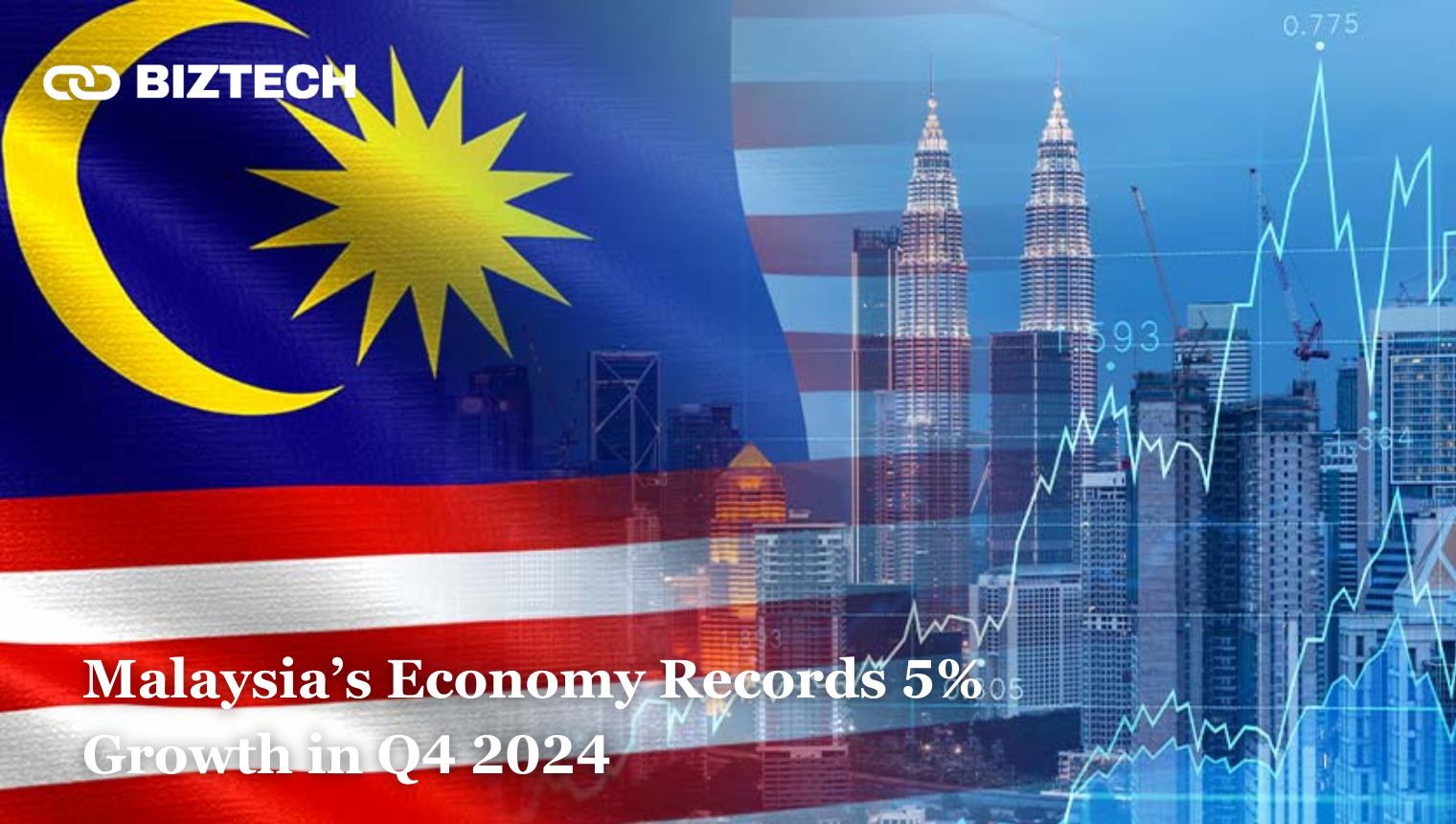Stay connected with BizTech Community—follow us on Instagram and Facebook for the latest news and reviews delivered straight to you.
Malaysia’s gross domestic product (GDP) grew by 5% in the fourth quarter of 2024, compared to 5.4% in the previous quarter. However, on a quarter-on-quarter seasonally adjusted basis, GDP contracted by 1.1% in the last three months of 2024 (Q3: up 1.9%).
Throughout Q4 2024, the Malaysian economy recorded growth rates of 4.7% in October, 4.9% in November, and accelerated to 5.4% in December. As a result, the country’s overall economic performance for 2024 stood at 5.1%, an improvement from 3.6% in the previous year.
Key Drivers of Economic Growth
Chief Statistician Datuk Seri Dr Mohd Uzir Mahidin attributed the 5% growth to positive momentum in most key sectors, except for agriculture and mining & quarrying, which declined in Q4 2024. He noted that substantial investment inflows, easing inflation, and an improving labour market—marked by near-decade-low unemployment rates—have strengthened domestic demand and supported national growth.
Sectoral Performance
Services Sector
The services sector expanded by 5.5% in Q4 2024 (Q3: 5.2%), driven by wholesale & retail trade growth at 4.4%, with contributions from wholesale trade (5.4%), retail trade (4.1%), and motor vehicles (2.2%). The transport & storage sub-sector saw significant growth at 10.7%, supported by strong consumer spending during the festive season and school holidays, aiding the recovery of tourism-related industries. However, the services sector contracted by 0.8% on a quarter-on-quarter seasonally adjusted basis (Q3: up 1.7%).
Manufacturing Sector
The manufacturing sector’s growth moderated to 4.4% (Q3: 5.6%), driven by higher external demand for export-oriented industries, including electrical, electronic & optical products (7.3%) and petroleum, chemical, rubber & plastic products (3.2%). However, domestic-oriented industries grew at a slower pace due to lower production in motor vehicles and transport equipment. On a quarter-on-quarter seasonally adjusted basis, the sector contracted by 2.8% (Q3: up 2%).
Construction Sector
The construction sector accelerated to 20.7% growth (Q3: 19.9%), marking its fastest expansion since Q2 2021. Growth was led by non-residential buildings (23.9%), particularly data center-related projects in Johor and Selangor, followed by specialized construction activities (23.6%), residential buildings (30.3%), and civil engineering (9.1%). Increased demand for renovation, maintenance, and infrastructure development projects supported this growth. However, the sector contracted by 2.3% on a quarter-on-quarter seasonally adjusted basis (Q3: up 5.7%).
Agriculture Sector
The agriculture sector declined by 0.5% (Q3: up 4%), primarily due to a 5.3% drop in the oil palm sub-sector. However, the sector’s downturn was mitigated by a 3% increase in the livestock sub-sector and a strong 23.3% expansion in the rubber sub-sector. On a quarter-on-quarter seasonally adjusted basis, the sector declined by 1.8% (Q3: 0.5%).
Mining & Quarrying Sector
The mining and quarrying sector shrank by 0.9% in Q4 (Q3: -3.9%), influenced by a 6.2% decline in the crude oil and condensate sub-sector. However, the natural gas sub-sector rebounded with 2.4% growth, driven by a recovery in gas production. On a quarter-on-quarter seasonally adjusted basis, the sector expanded by 5.9% (Q3: -1.1%).
Investment and Economic Outlook for 2025
Gross fixed capital formation (GFCF), representing investment in fixed assets, recorded an 11.7% increase (Q3: 15.3%), marking three consecutive quarters of double-digit growth.
Looking ahead to 2025, Malaysia’s economy is expected to remain resilient, driven by:
- A strong labour market
- Robust exports in the electrical and electronics sector
- Implementation of key investment initiatives
Private consumption will be boosted by the implementation of a minimum monthly wage increase to RM1,700, the Public Service Remuneration System adjustments with an RM10 billion allocation, and the Progressive Wage Policy, which will benefit 50,000 workers with an RM200 million allocation.






